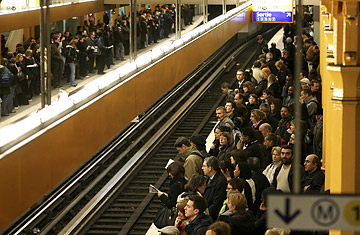
Passengers wait on an overcrowded platform in Gare de Lyon, Paris, on 14 November 2007.
It might have been touted in the media as the epic high noon of France's socio-economic evolution, but the nationwide transport strike that has left millions of French commuters stranded has not exactly roused them to momentous sentiment. "I'm all for people protecting their interests, but all these strikes are really becoming a pain," lamented department store salesman Pierre Bernard as he hustled on foot to work in central Paris. "In the end, people may wind up deciding whether they support the strikers or not based on who they blame most for making life hell: the strikers, or the government and reform that provoked the protest movement. Is that any way for society to operate?"
Like many of those for whom commuter trains, Metros, tramways or buses were either absent or too packed to board, Bernard found himself reflecting on French civics during his long walk to work. For most, it was only the most recent of the periodic seasons of forced-march commutes that began in the late 1980s, when labor disruptions first began thwarting efforts by successive governments to raise the retirement age for rail and utility workers. Once again, those workers have brought the nation to a crawl to protest pension-reforms proposed by President Nicolas Sarkozy. Already, rail and Metro unions have moved to prolong Wednesday's walkout for at least another day; they may well continue into next week to amplify protests planned by other civil service employees over government plans to eliminate nearly 23,000 public sector jobs next year.
"These people take the entire country hostage whenever they feel like it, and I hope this time Sarkozy will break them down and stop these endless strikes," said a woman who identified herself only as Cline, as she waited for one of Paris' rental bikes to become available. "Most of us work in the private sector — we don't have the luxury of striking, or staying home because others do."
That, however, was the very reason student Julien Deschamps says he backed the strikers — to a point. "The only place workers still defend their rights and entitlements is in the public sector, so they're sort of taking a stand for employees who don't by proxy," says Deschamps. "Let's face it: no one really knows if this pension reform is urgent or even necessary — everyone mostly supports or opposes it based on whether they like or hate Sarkozy." That, too, Deschamps indicates, is no way for a society to operate.
Early indicators suggested Wednesday's walkout didnt achieve quite the disruption of the previous strike on Oct. 15, although as much as 80% of service at state rail company SNCF was canceled, with the Paris Metro reporting a similar level of activity. As usual, the hardest hit by the strikes were suburban rail commuters, who turned up at stations to learn that that minimal service was expected only for the early morning and early evening commute. And, as of 9 a.m. Wednesday, authorities reported more than 215 miles of traffic bottlenecks on roads leading into the city. Disruptions are expected to continue on commuter rail and Metro systems on Thursday.
Political analysts had predicted the conflict over pensions fueling the strikes would prove long and bitter due to the stakes involved. The power of the labor unions is slowly ebbing in France, but pensions are one area in which they have successfully resisted reforms applied elsewhere in France. That may in fact by why Sarkozy made it such a priority to take the offensive on pension-reform so early in his presidency — to demonstrate he can prevail where his predecessors failed, and that he is willing to bet his political fate on it. For both Sarkozy and the unions, therefore, the pension struggle has been cast as a zero-sum game.
Amid the battle of wills between Sarkozy and the unions, however, commuters must simply make do as best they can. Outside train and Metro stations, activists of relatively new organizations distribute flyers denouncing the strike, and find themselves alternately signing up new recruits and fending off verbal abuse from Parisians with more traditional attitudes to labor-government relations. "The right to work and travel to work are among our fundamental freedoms these strikes continue denying!," shouted one militant near City Hall. "The right to strike is also a fundamental freedom — and one Sarkozy wants to take away from us all with the help of reactionaries like you!" answered a detractor as an amused crowed nodded or moved along laughing. Whatever rights the strike may put have put at risk, freedom of speech certainly retains its rude health in the City of Light.
